 The reason I blogged about Nobles Park last month was because I was thinking about the relationship between walking and writing, and the reason I was thinking about the relationship between walking and writing was because I'd just finished reading Charles Dickens and the Great Theatre of the World, which is a novelishly good biography of the great man by Simon Callow. (It might also explain why I've started writing interminably long sentences, containing interminable numbers of clauses, which is a dubious tendency even if you do happen to be Charles Dickens.) Anyway, the point is that Dickens not only wrote a lot; he also walked a lot. And I don't mean half hour rambles. 'Going for a walk' in Dickens-speak means pounding the streets of London for a minimum of three hours a day at an average pace of 4mph. And he did it because it nourished his writing. "It was," writes Simon Callow, "one of Dickens's maxims that a given amount of mental exertion should be counteracted by a commensurate amount of bodily fatigue...As he marched through the great metropolis, he drew energy from its energy and his absorption of its life replenished him."
The reason I blogged about Nobles Park last month was because I was thinking about the relationship between walking and writing, and the reason I was thinking about the relationship between walking and writing was because I'd just finished reading Charles Dickens and the Great Theatre of the World, which is a novelishly good biography of the great man by Simon Callow. (It might also explain why I've started writing interminably long sentences, containing interminable numbers of clauses, which is a dubious tendency even if you do happen to be Charles Dickens.) Anyway, the point is that Dickens not only wrote a lot; he also walked a lot. And I don't mean half hour rambles. 'Going for a walk' in Dickens-speak means pounding the streets of London for a minimum of three hours a day at an average pace of 4mph. And he did it because it nourished his writing. "It was," writes Simon Callow, "one of Dickens's maxims that a given amount of mental exertion should be counteracted by a commensurate amount of bodily fatigue...As he marched through the great metropolis, he drew energy from its energy and his absorption of its life replenished him." |
| The divine Mary Hogarth |
 |
| Catherine Dickens in 1852 |
 Catherine doesn't seem to have interested biographers or historical novelists*, any more than she interested her husband. I suppose the bare bones of her story - from pretty and loved to old and unloved - is not exactly rom-com material. I see there's a new film about Ellen Ternan called The Invisible Woman, based on the biography by Claire Tomalin. I'm sure it will be fascinating - of course it will, the clue's in the title. Much better (in film and literature, if not in life) to be The Invisible Woman. All that sexy mystique. But you have to feel for Catherine. After all, somebody had to play the thankless role of Dickens's All-Too-Visible-Wife. I hope someone writes a sympathetic account of her life some time soon, if only on the basis that visible lives are every bit as mysterious as invisible ones.
Catherine doesn't seem to have interested biographers or historical novelists*, any more than she interested her husband. I suppose the bare bones of her story - from pretty and loved to old and unloved - is not exactly rom-com material. I see there's a new film about Ellen Ternan called The Invisible Woman, based on the biography by Claire Tomalin. I'm sure it will be fascinating - of course it will, the clue's in the title. Much better (in film and literature, if not in life) to be The Invisible Woman. All that sexy mystique. But you have to feel for Catherine. After all, somebody had to play the thankless role of Dickens's All-Too-Visible-Wife. I hope someone writes a sympathetic account of her life some time soon, if only on the basis that visible lives are every bit as mysterious as invisible ones. * With the exception of Lillian Nayder. The Other Dickens : a life of Catherine Hogarth was the only item of Catherine Dickens literature I could find.